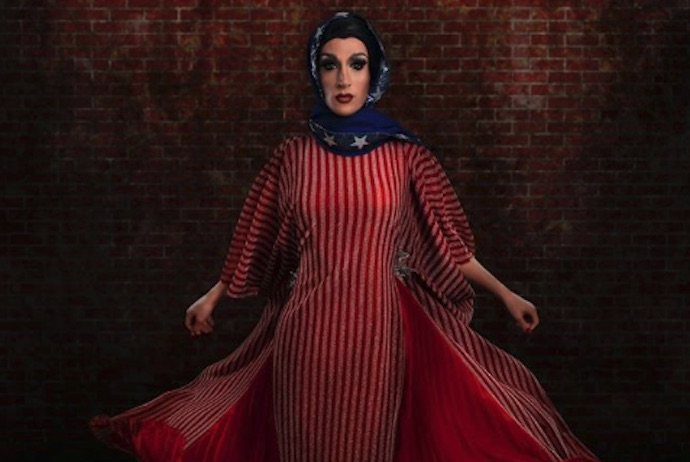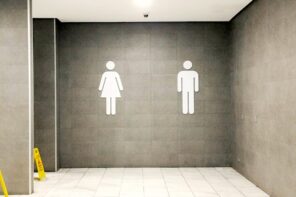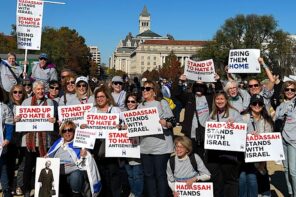Honestly, we blame ourselves.
We should have known that releasing an episode of Keeping It 101 (A Killjoy’s Introduction to Religion Podcast) about religion and RuPaul this past Wednesday meant we were in for some goopery when the next episode of Rupaul’s Drag Race aired two days later.
But how could we have known season 12 contender Jackie Cox would bring a freaking STARS AND STRIPES CAFTAN AND HIJAB to the ball? We. Were. Gagged.
That said: if we had known Ms. Cox would be featuring this garment on tonight, we could’ve clocked Jeff Goldblum’s Islamophobic response from clear across the club. We would’ve told you that women who dress like Cox to express modesty are immediately racialized as Muslim, forced to defend Islam against accusations that it is uniquely hostile toward women and queer people, and especially vulnerable to violence.
The Persian Princess of Drag
Cox has made much of her Iranian heritage, dubbing herself “the Persian Princess of Drag” and tearfully thanking Rep. Alexandria Ocasio-Cortez for her advocacy work on behalf of immigrants like Cox’s mother, an American citizen born in Iran. But so far this season—as we literally just said!—Cox has claimed her Iranian-ness solely in racial and cultural terms. Even when commending AOC for “working in Congress in solidarity with Congresswoman Tlaib and Congresswoman Omar,” the first two Muslim women elected to serve in Congress, Cox never said the words ‘Islam’ or ‘Muslim’.
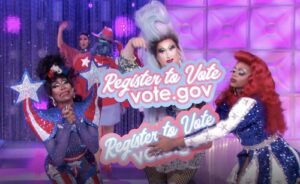
L to R: Jaida Essence Hall, the now-disgraced Sherry Pie, and Heidi entreat viewers to vote in the November 2020 presidential election while Jackie Cox waves from the top of the runway. See? Subtle. (Screengrab from episode 12)
We assumed that Cox or the producers or both had decided to frame Cox’s story explicitly in terms of racism and immigration, which fit neatly into season 12’s pronounced emphasis on urging viewers toward increased political engagement. (In drag’s grand tradition of understated subtlety, every episode now ends with the remaining queens prancing down the runway waving huge “REGISTER TO VOTE” signs. Image left.)
As religious studies scholars, we were thirsty for more explicit engagement with Cox’s religio-racial heritage. But we allowed that the show’s glossing of anti-Iranian hostility as racism was still important political work: though classified as white, Iranians in the United States (religious or otherwise) often face anti-Muslim hostility, which is related—but not reducible—to American white supremacy.¹
American whiteness is fragile, contested, and—especially for folks associated with Islam—contingent on good behavior. On episode 7, Jackie Cox wept while outing herself as the child of an immigrant from a Muslim-majority country and claiming “this part of [her] heritage that [she] hid for so long.” We were prepared to leave our analysis of Ms. Cox at that: viewers might suspect their Persian Princess had a relationship with Islam, but the show left Jackie’s religious commitments (or lack thereof) safely tucked out of sight.
But then SOMETHING HAPPENED, America.
Salaam RuPaul Joon
Episode 9, “Choices,” had contestants facing off in a debate to become America’s first drag president.² The pinnacle of every episode is the queen’s final runway looks; this week’s theme was “Stars and Stripes Forever.”³ And heeeeeere’s Jackie:
https://www.youtube.com/watch?v=pHzGOttxWtM
She’s giving us “a beautiful, [red and white] striped, flowing caftan” and “a midnight blue hijab that is outlined in fifty silver stars.” She’s insisting “you can be Middle Eastern, you can be Muslim, and you can still be American.”
In the immortal words of Latrice Royale: she said THAT.
As Jackie Cox swanned down the runway trailing her patriotic caftan behind her, guest judge, dinosaur Zaddy, and Woody Allen defender Jeff Goldblum let out an “oooooh” or a “nooooo.” Either way, it was clear Cox’s look evoked a strong response from Goldblum. Camera held tight on his face for reactions; Goldblum seemed fixated and (to our trained killjoy eye) bordering on disgust.
A smiling Cox faced the judges with a cheery “salaam RuPaul joon!” Veteran judge Carson Kressley called her outfit “beautiful and touching” and said it “makes a political statement;”4 guest judge Rachel Bloom celebrated that Cox’s “simple outfit…says so much” about what “America really is.”5 This presentation primes the viewer to see Cox’s eleganza as boundary-pushing and indicative of something essential about Jackie Cox as a performer.
If you watched the show or you study religion or you exist on the internet, you already know what happened next.
“Are you religious, may I ask?” Goldblum inquired, because OF COURSE HE DID, eyebrows raised above thick black nerd glasses, elbow propped on the judges’ table, supporting a face slouched casually against his hand. Cox replied that she’s not religious and insisted that the importance of her outfit lies in “the visibility religious minorities need to have in this country.”
“Isn’t this an interesting wrinkle, though,” Goldblum continued, waving his hands around his face with pre-COVID abandon. “Is there something in that religion that is anti-homosexuality and anti-woman? Does that complicate the issue?” (emphasis added, and Reader: feel free to pause and hit the shade rattle button if you need to). “I’m just raising it and thinking out loud and maybe being stupid. What do you think?” he concluded.
We’re so glad you asked us that, Jeff Goldblum. Here’s what we think:

Seeing a hijab-wearing woman and dribbling half-baked, anti-Muslim talking points from out the mouth atop your admittedly striking and grizzled jawline does not make us think you’re interesting, Jeff Goldblum. It makes us think you haven’t done your homework.
Islamophobia is Not an “Interesting Wrinkle”
Here’s the T: religion has always been messy on Drag Race—which makes sense, since religion is messy in general. Keeping It 101, like Marie Kondo, loves mess, so you know we had to get into this gig. Whether it means to or not, Drag Race has always given us characters with complicated relationships to religion: Monique Heart’s devout Christianity despite undergoing conversion therapy; Valentina claiming la Virgen de Guadalupe as her drag mother; debates about whose religiously-inspired garments are culturally appropriate and whose are appropriation.
Religion should be messy on Drag Race, we’ve argued, because religion is what people do, and people are some messy bitches. Lived religious experience changes as people change; rarely are people just one thing or one thing all the time or one thing throughout their whole lives. Jackie Cox has been bringing the complexity of her Iranian identity to us every week. But despite Cox asserting her Iranian-ness in terms of culture, national origin, and ethnicity, the judges read her “Stars and Stripes Forever” outfit exclusively and explicitly as religious.
As RuPaul’s longtime co-host Michelle Visage would say: meh.
Look, we’re not surprised. Americans know disturbingly little about pious fashion, which has led to some truly tragic and dehumanizing feature items on nonwestern modesty practices. Most Americans still seem unaware that how people cover their bodies has far more to do with where they are than whether they belong to a particular religious community (though students always nod when we explain that folks going out on the town in New York City dress differently than in, say, Tuscaloosa). Folks who wrinkle their noses at Muslim modest fashion seldom express the same concerns about conservative Christian women in long skirts and long-sleeved blouses. We know how you do, America. We work on racialization and religious intolerance.
As we discussed on our “Religion Is Not Done with You” episode, we also know that Muslim-coded people don’t get to opt out of Islam: “Arab-looking” folks, folks with “Muslim-sounding” names, Sikhs in turbans, folks who dress in “Muslim garb,” all get read as Muslim. Identifying as atheist doesn’t get anyone who can be read as Muslim out of “totally random” TSA pat downs. This is how we racialize Islam, distilling a billion-person millenium-old global religion into one (terrifying, not-American) thing.
So yeah, when Jeff Goldblum looks at Jackie Cox in a hijab and says “that religion,” of course we know what he means. Goldblum doesn’t say “Islam”—in fact, no one says Islam or Muslim for the rest of the episode. No one has to. With this question-cum-critique, Islam became what was happening On Tonight, and Goldblum became every white dude in any audience or classroom who doesn’t think he’s racist, who doesn’t realize he’s part of the problem, and who definitely didn’t do the reading.
That Religion
Goldblum’s use of that here—making Islam “that religion,” unnamed and unsafe for women and queer people—belies the disgust we clocked on his face as Cox brought modest fashion to the runway. He’s asking (though it’s really more of a comment than a question) whether the religion he projects onto Cox’s queer, feminine-presenting body hates her queer, feminine-presenting self; hates all women and queers.
Goldblum is asking Cox if Islam hates her, the beautiful queen standing before him, who chose to wear this clothing to represent herself and her communities. Goldblum begs the question of Islam-as-oppressive, as though expecting Cox to thank him for liberating her with his tired, basic question.
Dinosaur Zaddy, WYD? Why are you proving our point by assuming folks who look like Muslims must be religious—immediately racializing and pigeon-holing literal billions of people? Why would you assume you already know everything you need to know about Islam?
Oh, right. Because you’re American, and America is that girl. We knew she was.
Cox, to her credit, ignored the bigotry and argued for complexity: “I’m not [religious],” she told Goldblum. “I have my own misgivings about how LGBT people are treated in the Middle East, and at the same time, I am one. But…when the Muslim ban happened, it really destroyed a lot of my faith in this country, and it really hurt my family.” (Jeff Goldblum, open-mouthed, nodded along as Cox spoke.) “I’m here, and I deserve to be in America as much as anyone else.”
In a challenge meant to celebrate American inclusivity, Cox had to share her personal trauma and champion religious freedom (very American of her, no?) so as not to have to defend a religion of 1.9 billion people (Islam), a nation-state of 82 million (Iran), and an immigrant community already under siege.
Goldblum’s comments are dangerous. Characterizing Islam as inherently anti-LGBTQ, anti-women, anti-anything, really, falsely collapses the complexity of Islam and Muslims into a conservative anti-American monolith—while letting America off the hook for the very real damage it’s doing to women, LGBTQ people, immigrants, and Muslims every day, and with increased urgency during our nation’s public health crisis.
We the People
Standing on the stage in front of the judges, Cox—like so many women who cover—found the complexity of her identity reduced to the fabric on her head. Despite not being religious, Drag Race stripped her complicated performance down to its proximity to Islam. It might be too much to expect a campy televised game show to give us realness about religion, except that historically, that’s exactly what Drag Race has done.
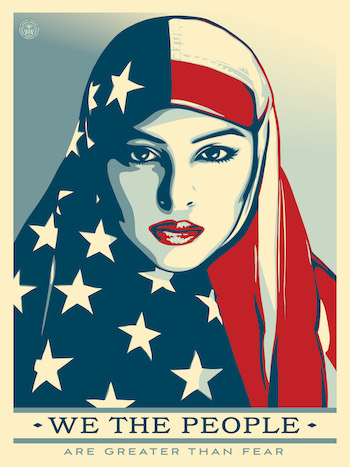
Shepard Fairey’s “We the People Are Greater than Fear.”
RuPaul loves a reference, but no one on that judges panel seemed to get that Cox’s caftan and hijab were inspired by Shepard Fairey’s “WE THE PEOPLE are greater than fear,” part of a poster series created in response to the 2016 election [image left].
Many people carried this image during nation-wide Women’s Marches in January 2017 to protest the 45th president’s inauguration. The poster inspired praise (for including a modest Muslim woman as a symbol of American patriotism) and criticism (for implying Muslims need to support American militarism and imperialism to be “truly” American).
Not all Muslim women feel liberated by the image Cox is referencing; as Muslim fashion blogger Hoda Katebi says, “Know that Muslims are tired of having to ‘prove’ they are American [and] know that one does not need to be American to deserve respect, humanity, dignity, equality, rights and freedom from hate and bigotry. An over-emphasis on being American as a prerequisite of deserving respect is harmful for immigrants and refugees.”
How a woman (or a man dressed as one) engages with religion (or not) is not something you can tell by looking at her. Muslim women are more than what they put (or not) on their heads. Looking at a woman who covers and assuming she’s an observant Muslim contributes to the racialization of Muslims—the fear that Muslims are too different, too dangerous, to be allowed to be fully American. Asking a female-presenting person who covers her head with a hijab whether Islam hates women or queers implies that the woman needs saving, that she hasn’t chosen to dress herself in a way she knows makes her a more likely target for hate speech and violence. Assuming Islam hates Muslim women or queer Muslims is some white nonsense: Islam hates nothing; all religions are made up of people.
Assuming a Muslim woman or a queer Muslim must be especially at risk because of their religious belonging collapses a long, complex history of gender relations in Islam into a soundbite that makes the internet yell at you, Jeff Goldblum. It ignores that many religions, including Islam, can and do contribute to both the empowerment and the oppression of women. Because religion is what people do, DinoZaddy, and history has shown us that people oppress women.
When you look at a woman who covers her head and assume you know everything worth knowing about her, Jeff Goldblum, you make an ass out of you. And us, as it turns out, for releasing our hot take on RuPaul and religion too early to yell about this on the air. Better luck next season, we guess.
In the meantime: salaam, Khanoom Jackie Cox joon. Thank you for not turning your pious fashion runway moment into a reveal. We stan.
1 Check out the Islamophobia Is Racism syllabus and especially Neda Maghbouleh’s excellent Limits of Whiteness (Stanford 2017) for more on this religio-racial tension.
2 Again. Season 4 episode 9, “Frock the Vote,” featured precisely this format — but that was before the show hit basic cable and expanded its mainstream viewership. This is probably for the best, as Chad Michaels’ “LadyPimp” platform has not aged well. And PhiPhi O’Hara’s calling Black queens “the help” didn’t play well even then.
3 Personally, we would have gone with “Amer-I-Can!” but we’re still waiting for our recruiting call from the show’s producers.
4 Speaking of political statements: don’t even get us started on Carson telling Widow that she came off as an angry Black woman, or on the fact that the lipsync for your life literally pitted a Black queen against a hijabi queen while declaring the white queen in ACTUAL IMPERIAL GARB safe. We cannot even.
5 Bloom called America “a nation of immigrants,” which obviously obscures the genocidal violence perpetrated against the Indigenous peoples of what is now the United States and against those forcibly removed and enslaved to become the bedrock of this country’s economy.


